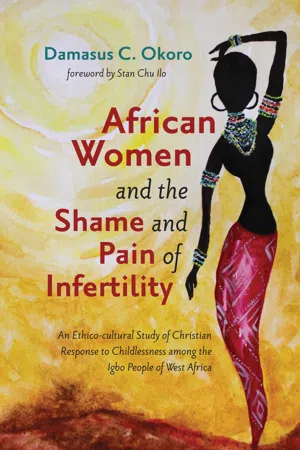
African Women and the Shame and Pain of Infertility
An Ethico-cultural Study of Christian Response to Childlessness among the Igbo People of West Africa
Damasus C. Okoro
- 214 Seiten
- English
- ePUB (handyfreundlich)
- Über iOS und Android verfügbar
African Women and the Shame and Pain of Infertility
An Ethico-cultural Study of Christian Response to Childlessness among the Igbo People of West Africa
Damasus C. Okoro
Über dieses Buch
In African Women and the Shame and Pain of Infertility: An Ethico-Cultural Study of Christian Response to Childlessness among the Igbo People of West Africa, Okoro discusses the shipwreck that is associated with infertility in marriage in Africa. Within this space, childlessness places a big question mark on a woman's femininity and the self-esteem of the man. The stigma of infertility most often leads to social isolation and humiliation, particularly of married women, even when the source of infertility may not have come from them. Unfortunately, this situation goes against the highly valued Igbo ethical principle of onye aghala nwanne ya, meaning "no kith or kin should be left behind." Therefore, the purpose of the book is to help married people in Igbo land and Africa at large to appropriate this indigenous principle in their response to the problem of infertility. To attain this, the author critically evaluates discrimination and oppression of infertile couples, particularly women, and shedding light on the paradoxes found in Igbo cultural expressions. He employs a constructive, ethical, cultural, religious, contextual, and theological approach that explores important Igbo religious paradigms like Chi (an Igbo religio-cultural understanding of personal destiny) and Ani (the feminine deity in-charge of the land and fertility) to argue the case for the liberation and integration of infertile couples.
Häufig gestellte Fragen
Information
A Historical and Socio-Context Analysis of Igbo World
Inhaltsverzeichnis
- Title Page
- Praise for and Quotes by Paul Frey
- Foreword
- Preface
- Acknowledgements
- Introduction
- Chapter 1: A Historical and Socio-Context Analysis of Igbo World
- Chapter 2: Infertility
- Chapter 3: Engaging African Female Theologies
- Chapter 4: Engaging African Male Theology/Ethics
- Chapter 5: Onye Aghala Nwanne Ya
- Chapter 6: Conclusion
- Appendix 1: Umuokpara Family Marriage List
- Appendix 2: Umuokpara Family Women Marriage List